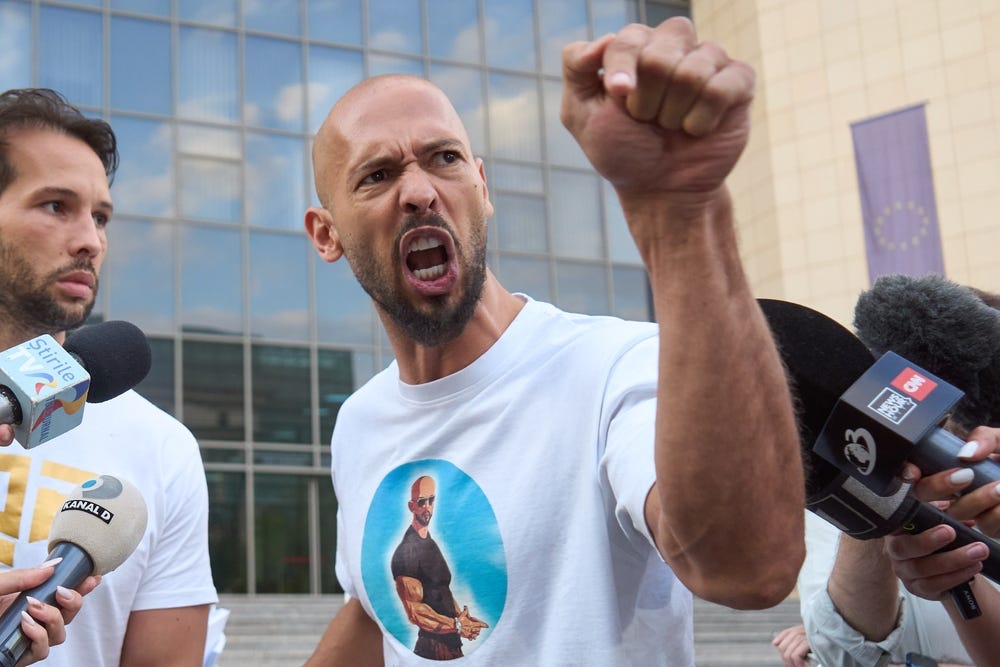The masculinity crisis: How economic struggles and Andrew Tate are radicalizing young men
With housing out of reach, wages stagnant, and traditional career paths fading, young men are searching for a sense of purpose—and finding it in all the wrong places.

Andrew Tate, a kickboxer turned self-proclaimed entrepreneur and life coach, is one of today's most controversial and influential online figures. His content preaches self-discipline, financial independence, and extreme masculinity. He attracts young men to his content by showcasing overt displays of wealth and presenting moralizing takes on sex and “traditional” gender roles.
But Tate isn’t just a social media figure—he is also facing charges of human trafficking in Romania and sexual aggression in the United Kingdom. Though Tate denies any wrongdoing, the charges and allegations against him are so severe that when he recently returned to the United States, landing in Florida, Gov. Ron DeSantis publicly condemned him, calling for an inquiry into his activities. Meanwhile, UFC President Dana White, a vocal supporter of Donald Trump, embraced Tate. The divisive response to Tate suggests a broader cultural battle over masculinity.
Tate’s influence is years in the making. By mid-2022, his name garnered more Google searches than Donald Trump and COVID-19. Despite racking up billions of views across his platforms, Facebook, Instagram, and TikTok eventually banned him for hate speech. However, clips of Tate continued to garner millions of views on Andrew Tate fan accounts.
Messages such as “it only takes one lying woman to destroy a man. Women typically allow Satan into a man's life.” or “When women talk, I turn my brain off, and I’ve never missed anything important ever.”
This article is not about Tate. Rather, it is about the environment that has allowed him to become so influential. His online messages resonate with young men feeling lost, economically insecure, and disconnected from “traditional gender roles.” Many of these young men see mainstream culture as hostile to masculinity and their perceived role in society. Tate offers them an alternative lifestyle rooted in empowerment—with others bearing the cost.
The Loss of the “Traditional” Male Role
Tate's so-called "empowering" message for men hinges on rejecting the "traditional" lifestyles of past decades. The nuclear family model was built around a father who earned enough to support a stay-at-home wife, who would raise the children and fulfill the duties of homemaking. But over the last century, this role has rightfully shifted. Women today have greater economic independence, pursue higher education at higher rates than men, and now out-earn men in certain jobs. Meanwhile, marriage rates are declining, and more women are choosing to live independently. For young men whose mothers were more economically dependent on men, this shift has been disorienting. Men who can’t assume power by being breadwinners are left searching for identity and purpose. Andrew Tate has built his business on exploiting this void for young men, pushing the belief that the world exists to bend to a man's will.
Economic Uncertainty and the "Hustle Culture" Appeal
Tate’s rhetoric about financial success is another key draw for young men. Recessions, a global pandemic, and regressive tax policies have allowed wealth inequality to skyrocket. When wages are stagnant and stable career paths no longer seem financially viable, achieving independence outside of mainstream systems is an appealing offer.
Tate’s message is clear: Get rich, get strong, and take control. He promotes extreme self-sufficiency, pushing impressionable young men into a belief system that teaches them to rely on only themselves. He reinforces this by touting unconventional “entrepreneurship” ventures like cryptocurrency and online businesses and a winner-takes-all mindset.
Of course, you could learn all of his teachings through his online subscription-based service, "Hustlers University." With just a small investment in his courses, you could—supposedly—put yourself on the path to financial independence. At least that’s what the 200,000 + users were told before the website shut down.
Body Image Pressures and the Rise of "Alpha Male" Culture
Beyond wealth and the pursuit of “traditional” masculinity, achieving the ideal body has become an increasing concern for young men. Though it is widely recognized that young women’s perceptions of beauty standards are distorted by social media, the fact that young men experience similar pressures is rarely discussed.
The pressure to be strong, tall and lean is more than a social expectation—for many, it has become a full-blown obsession. This issue has only worsened with the rise of “gym bro” culture which is fueled by social media influencers encouraging restrictive eating, extreme workout routines, and even steroid abuse.
Tate and other “alpha male” influencers reinforce the idea that a man’s social worth is tied to his physical power and appearance. If you’re not in shape, you’re weak. If you aren’t constantly improving yourself, you’re lazy.
How Gaming, Sports, and Comedy Have Shifted Right
The reach for figures like Tate is broad. Online leisure spaces that once permitted escapism— gaming, sports, and comedy—have evolved into right-wing ecosystems.
Gaming communities are saturated with discussions on masculinity and rejecting “woke” culture. Popular streamers collaborate with guests who push right-wing ideologies. When they receive pushback from their audiences, they deflect blame by hiding under the dogma of free speech.
Sports media is now rife with promotions of sports gambling and figures like Logan Paul (a popular online influencer), who happily endorsed Trump.
But no online space has become more contentious than comedy. Comedic podcasters like Andrew Schulz and Theo Von have consistently espoused right-wing talking points. Von even featured Trump on his YouTube podcast This Past Weekend weeks before the 2024 Presidential Election. It’s no surprise that Von and Paul both attended Trump’s inauguration. These figures, who once represented the growing influence of social media on pop culture, now symbolize a stark ideological shift of many young men in America.
The Bigger Picture
Tate and others like him aren’t solely responsible for the shifting political attitudes of impressionable young men. The role of men in society is evolving, economic prospects are grim, and pressures regarding body image are rising. During this transitional era, mainstream institutions have failed to provide young men with a healthy, structured foundation to build their lives upon. Without guidance, they are resigned to seek stability and clarity independently. In doing so, many have stumbled on a vast, sprawling network of misogynistic messiahs who have turned spreading bigotry into their full-time job.
Banning Tate and other figures from social media won’t change the fact that millions of young men are searching for meaning—and if they don’t find it in constructive spaces, they will find it from people like him. The solution isn’t censorship or mockery; it requires a serious conversation about why young men feel abandoned and what can be done to restore their sense of purpose. As long as they feel unheard, they’ll keep turning toward the loudest voice that acknowledges them.
Right-wing echo chambers have presented young men with a false dichotomy: blame women and minorities, or accept that they are lazy, untalented losers. For those who already feel insecure and aimless, this isn't much of a choice.
To course-correct from this dark path, young men and women must be empowered to build sustainable and healthy futures through policies that address the cost of housing and affordable education and by strengthening economic opportunities. Doing so would reduce the primary power source for figures like Tate. And in the long run, that would benefit everyone.
Olivia Julianna is an abortion rights advocate and strategist from Texas. She was director of politics and government affairs for Gen-Z for Change.






Interestingly, these guys are trying so hard to prove how "manly" they are that they end up proving the opposite. It's a very insecure teenager way to look at the world.
A small but I believe important distinction of word usage.
"His content preaches self-discipline, financial independence, and extreme masculinity."
He DOES NOT preach "extreme masculinity." He proposes that misogyny, brutality, aggression, and violence, are the essential character traits for "masculine" men. This is an extremist view of what masculinity should look like, but it is not masculinity in any way shape or form.